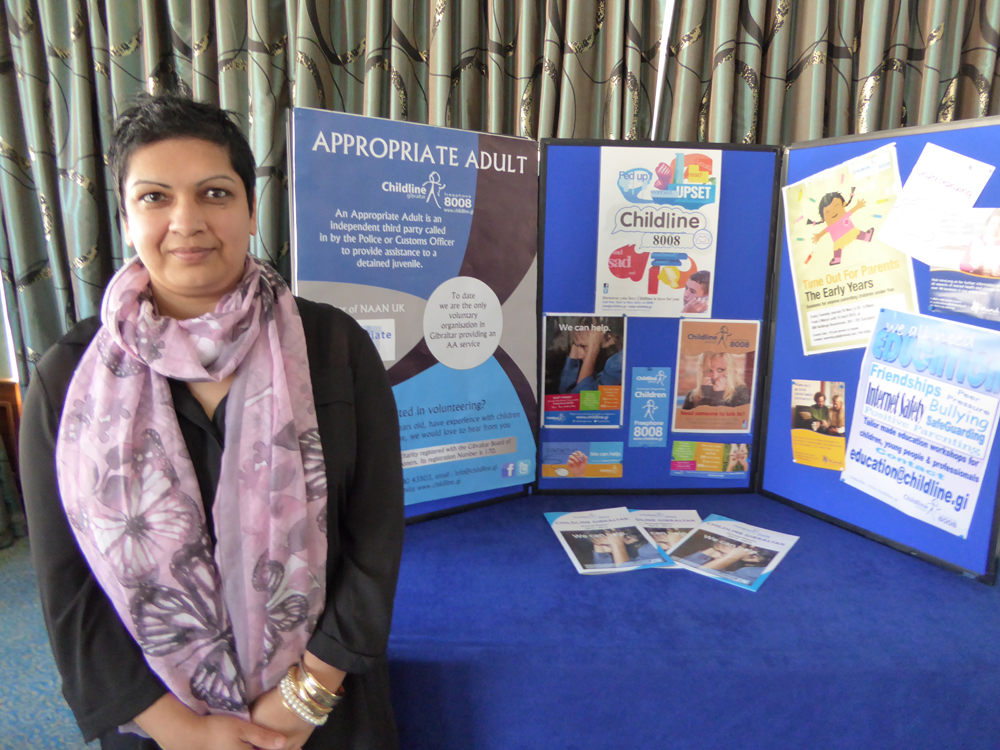Mar 03 – Understanding Self-Harm – YGTV Speaks To MIND Associate Trainer
 Childline Gibraltar this week held a seminar entitled “Self-Harm Uncovered”. Vaijayanti Drumm, a trainer from the UK mental health charity MIND, came to Gibraltar to deliver two identical seminars at the Eliott Hotel. We caught up with her and Jo Abergel from Childline to speak about self-harm…
Childline Gibraltar this week held a seminar entitled “Self-Harm Uncovered”. Vaijayanti Drumm, a trainer from the UK mental health charity MIND, came to Gibraltar to deliver two identical seminars at the Eliott Hotel. We caught up with her and Jo Abergel from Childline to speak about self-harm…
YGTV: What is the definition of “self-harm”?
Vaijayanti: A lot of people think of “self-harm” as only involving self-injury like cutting but really it encompasses all sorts of behaviour like eating too much or too little, abusing drugs and alcohol and over-sexualised behaviour.
YGTV: Has there been a rise in cases of self-harm, especially amongst young people?
V: In the UK, self-harm as gone up 65% in the past decade so it’s a huge rise.
YGTV: What explains this alarming rise?
V: It’s very complex – mental illness is also on the rise…soon, one in three of us will suffer from a mental illness at some point in our lives. We live in a really complex society full of subliminal images on the media and the pressures of social networks and the constant comparisons we make to the rest of the world. We are now into the third generation of young people who haven’t learned coping strategies to deal with life’s problems. We live in stressful times and many young people don’t have the resources or the resilience to cope so they resort to extreme measures. Families and communities are also changing so perhaps there isn’t the same level of support anymore.
YGTV: Why do people who are experiencing mental health problems harm themselves? Why do they feel that cutting or bruising one’s arms, for example, helps?
V: There are many different reasons. Human beings are very goal-oriented – there’s a reason for their actions. Sometimes it’s a way of communicating distress, of letting others know that things aren’t going well. Often, it’s the only thing people who are suffering feel they have control over. For others, it’s a way of getting rid of emotional distress or even disassociating themselves from distress like historical or current abuse. For some people, it can also be a comfort – I’ve heard some people describe self-harm as their “best friend.”
YGTV: Is there a real danger in many cases that it might escalate and turn into suicide attempts?
V: That’s a real worry for parents but, actually, that fear can be transferred onto the child. There’s no correlation between self harming and suicidal ideation. For a lot of people, it’s actually a way of carrying on with life, of coping with life’s stresses. There is, however, a correlation between self-harm and accidentally taking your life.
YGTV: What are the warning signs that parents should look out for?
V: They should look out for increases in anxiety and hopelessness – there’s also external factors like exams, school stresses and bullying which can be the main causes of such behaviour. People don’t wake up suddenly one morning and decide to self-harm – they become overwhelmed throughout a specific time period and there are a lot of early warning signs that things aren’t going well emotionally.
YGTV: Tell me a bit about the conference you’re holding here in Gibraltar.
V: Hopefully, it’s a way of getting professionals, carers and parents together to discuss the issue openly, honestly and transparently which is very important in the case of self-harm. We want to see what support is available here for people who suffer from these problems.
We also spoke to Jo Abergel from Childline Gibraltar…
YGTV: What are the aims of this conference?
Jo: There are two major aims for this conference: the first is to raise awareness about the issue, the second is to get all the professionals and parents together to explore what support there is for people dealing with self-harm. We know there are various agencies dealing with this: Childline helps out, the GHA gets referrals and the Community Mental Health team but there’s also teachers and other groups in the community. We want to see if we can get together and tackle this issue as a community.
YGTV: How many reports of self-harm does Childline receive?
J: We get online referrals, social media referrals and calls so it’s difficult to put a number on it. There’s definitely been and increase – when we visit schools and youth groups, sports groups, for example, we hear that there are a lot of people having to deal with self-harm.
If you have concerns about self-harm, contact Childline on: www.childline.gi or via their Facebook page: https://www.facebook.com/childlinegibraltar?fref=ts
Latest News
- Giovanni Origo Budget Speech 2025 - GSD Shadow Minster for Youth, Tourism, the Environment and Transport
- Budget 2025 Speech by Minister for Industrial Relations, Civil Contingencies and Sport, Leslie Bruzon
- HM Customs Gibraltar Launches ASYCUDA Version 4.4 to Modernise Border Management
- Budget 2025 Speech by Minister for Equality, Employment, Culture and Tourism Christian Santos
- Declaration Of Enlistment By Royal Gibraltar Police Recruits
- Local Actors Travel To UK Drama Festival
- Bridge House Charitable Trust Welcomes Donations
- GSD Says Principal Auditor Report 2018/19 Should Now Emerge
- The Budget 2025 – Minister Gemma Arias-Vasquez's Address
- Ministry Of Equality Marks Successful End Of The Sixth Cycle Of The Women’s Mentorship Programme



